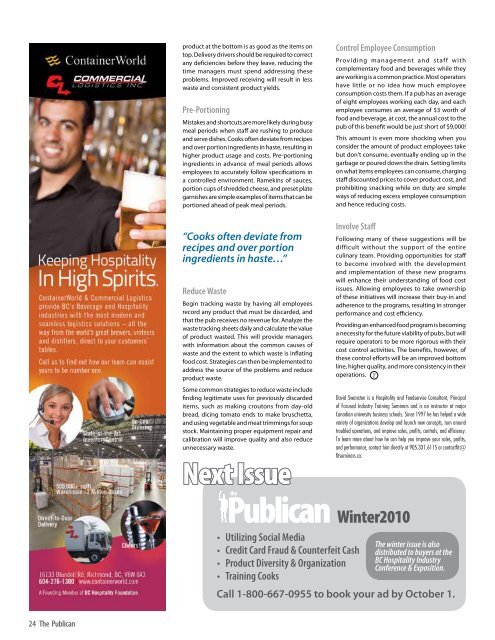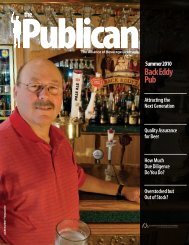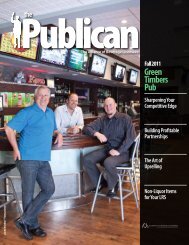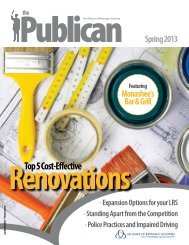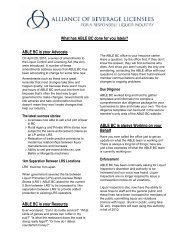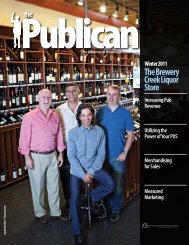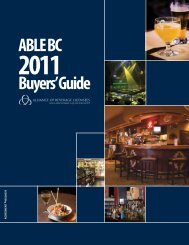The Spike Pub & Liquor Store - ABLE BC
The Spike Pub & Liquor Store - ABLE BC
The Spike Pub & Liquor Store - ABLE BC
You also want an ePaper? Increase the reach of your titles
YUMPU automatically turns print PDFs into web optimized ePapers that Google loves.
product at the bottom is as good as the items on<br />
top. Delivery drivers should be required to correct<br />
any deficiencies before they leave, reducing the<br />
time managers must spend addressing these<br />
problems. Improved receiving will result in less<br />
waste and consistent product yields.<br />
Pre-Portioning<br />
Mistakes and shortcuts are more likely during busy<br />
meal periods when staff are rushing to produce<br />
and serve dishes. Cooks often deviate from recipes<br />
and over portion ingredients in haste, resulting in<br />
higher product usage and costs. Pre-portioning<br />
ingredients in advance of meal periods allows<br />
employees to accurately follow specifications in<br />
a controlled environment. Ramekins of sauces,<br />
portion cups of shredded cheese, and preset plate<br />
garnishes are simple examples of items that can be<br />
portioned ahead of peak meal periods.<br />
Control Employee Consumption<br />
Providing management and staff with<br />
complementary food and beverages while they<br />
are working is a common practice. Most operators<br />
have little or no idea how much employee<br />
consumption costs them. If a pub has an average<br />
of eight employees working each day, and each<br />
employee consumes an average of $3 worth of<br />
food and beverage, at cost, the annual cost to the<br />
pub of this benefit would be just short of $9,000!<br />
This amount is even more shocking when you<br />
consider the amount of product employees take<br />
but don't consume, eventually ending up in the<br />
garbage or poured down the drain. Setting limits<br />
on what items employees can consume, charging<br />
staff discounted prices to cover product cost, and<br />
prohibiting snacking while on duty are simple<br />
ways of reducing excess employee consumption<br />
and hence reducing costs.<br />
“Cooks often deviate from<br />
recipes and over portion<br />
ingredients in haste…”<br />
Reduce Waste<br />
Begin tracking waste by having all employees<br />
record any product that must be discarded, and<br />
that the pub receives no revenue for. Analyze the<br />
waste tracking sheets daily and calculate the value<br />
of product wasted. This will provide managers<br />
with information about the common causes of<br />
waste and the extent to which waste is inflating<br />
food cost. Strategies can then be implemented to<br />
address the source of the problems and reduce<br />
product waste.<br />
Some common strategies to reduce waste include<br />
finding legitimate uses for previously discarded<br />
items, such as making croutons from day-old<br />
bread, dicing tomato ends to make bruschetta,<br />
and using vegetable and meat trimmings for soup<br />
stock. Maintaining proper equipment repair and<br />
calibration will improve quality and also reduce<br />
unnecessary waste.<br />
Next Issue<br />
the<br />
<strong>Pub</strong>lican<br />
Involve Staff<br />
• Utilizing Social Media<br />
• Credit Card Fraud & Counterfeit Cash<br />
• Product Diversity & Organization<br />
• Training Cooks<br />
Following many of these suggestions will be<br />
difficult without the support of the entire<br />
culinary team. Providing opportunities for staff<br />
to become involved with the development<br />
and implementation of these new programs<br />
will enhance their understanding of food cost<br />
issues. Allowing employees to take ownership<br />
of these initiatives will increase their buy-in and<br />
adherence to the programs, resulting in stronger<br />
performance and cost efficiency.<br />
Providing an enhanced food program is becoming<br />
a necessity for the future viability of pubs, but will<br />
require operators to be more rigorous with their<br />
cost control activities. <strong>The</strong> benefits, however, of<br />
these control efforts will be an improved bottom<br />
line, higher quality, and more consistency in their<br />
operations.<br />
David Swanston is a Hospitality and Foodservice Consultant, Principal<br />
of Focused Industry Training Seminars and is an instructor at major<br />
Canadian university business schools. Since 1997 he has helped a wide<br />
variety of organizations develop and launch new concepts, turn around<br />
troubled operations, and improve sales, profits, controls, and efficiency.<br />
To learn more about how he can help you improve your sales, profits,<br />
and performance, contact him directly at 905.331.6115 or contactfit@<br />
fitseminars.ca.<br />
Winter2010<br />
<strong>The</strong> winter issue is also<br />
distributed to buyers at the<br />
<strong>BC</strong> Hospitality Industry<br />
Conference & Exposition.<br />
Call 1-800-667-0955 to book your ad by October 1.<br />
24 <strong>The</strong> <strong>Pub</strong>lican


